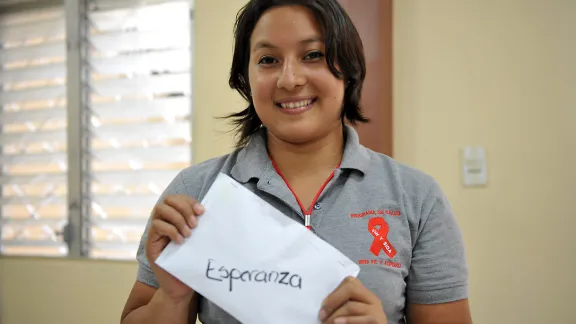
Maria. Photo: LWF/C. Kästner
(LWI) – “We live as if in a prison,” Maria (not he real name) says. “We cannot go outside, and even in our homes we are not safe. You have to keep doors and windows closed. Even when you’re at home, you can be robbed or kidnapped.”
The young woman left her country because her family was threatened by a gang. “We have relatives in the United States, so they presumed we had money,” she recalls.
Maria’s home country, Honduras, holds the sad record of most violent deaths outside a war zone. The reason is gangs, which extort money and forcefully recruit mostly young people below punishable age to act as their couriers. If they refuse, they might be killed.”
When Maria’s family was threatened, they left – overnight, secretly so the gang would not find out, and with little more than the clothes they were wearing. With nothing but a small bag she went to Guatemala and lived there for years until it was safe to return. She paid a high price. “My family was broken,” she says. Her marriage did not survive the separation.
The LWF ecumenical leadership project in Central America, initiated by the Department for World Service and implemented by the local member churches, provides a perspective for young returning migrants.
Some come back voluntarily, like Maria. Most get caught by US border police, and are held in detention centers and eventually deported. To prevent them entering a fateful cycle of earning money for the next migration attempt, LWF is setting up livelihoods projects which give them perspective in their home country. It is an uphill battle. “Whenever you start a business and it goes well, you must fear that some gang will show up and shut it down,” one of the young people says hopelessly.
Although they could not stop the omnipresent gang violence, the group of young people at the church has provided the support and security that Maria needed to start again. “For me, the church is like a second home. I feel that we can really transmit a message of faith and hope,” she says.


